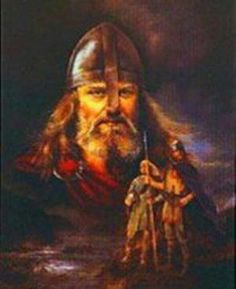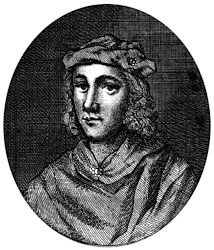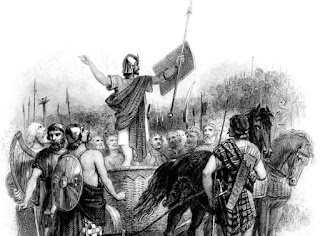Turning the Tide
Turning the Tide
The north-west frontier of the Roman Empire for 50 years from the 160s AD was Hadrian's Wall. To the north, forts stretched as far as Newstead on the Tweed, which extended Roman surveillance, while treaties with the Caledonians brought their influence to the edge of the Highlands and even into that great wilderness.
The tribes had submitted reluctantly to Roman domination, and the peace of the northern frontier was broken on several occasions.
In 208, the situation was so serious the presence of Emperor Septimius Severus himself was required as the Caledonians and the Macatae (whose name appears to survive in Dum Myot and Myot Hill near Stirling) fought a guerrilla campaign.
Although eventually the Caledonians were forced to sue for peace it was not long before they were rebelling again. Severus, now terminally ill, sent his elder son, Caracalla, to bring the northern tribes to heel, but with the announcement of his the death in York, on February 4, 211, Gialla brought the military campaigns to speedy end, abandoning even the newly-acquired territories and forts.
Adrian's Wall again became the northern frontier and was to remain so for another 200 years. Some northern outpost forts continued in use, together with a scouting system, which lasted until 367 when it was also abandoned. So far as we can tell, the northern frontier was peaceful throughout the third century, but in 297 we first hear a new name in the north-the Picts.
The descendants of the Caledonians and their allies, the Picts, were to develop into major and worthy opponents.
Three generations of emperors campaigned against them and in 367 the Picts and Gaels, then living in Ireland, and perhaps Argyll, led a great invasion against the northern extreme of the Roman Empire.
The Romans retrieved the situation, but their control was crumbling, and they faced further rebellion up to the end of Roman Britain in 411. But even then the Roman frontier seems to have continued to fulfil its purpose, because the Picts failed to secure a foothold in the shadow of Had's Well.
Why did the Romans fail to conquer Scotland? Over 300 years, Scotland lay on the very edge of the Roman Empire, most of it remained unconquered and those forts which were subjugated were Roman for only limited periods.
Certainly, the expeditions which penetrated beyond the Forth met strong opposition. The terrain, too, was difficult, though the Romans had dealt with worse.
There seems to have been no economic inducement to conquest, not that the Romans appear to have thought in those terms. Perhaps, too, the political institutions of the Caledonians were insufficiently advanced to allow their easy absorption into the Roman empire. But the location of Scotland on the far north-west frontier of the empire and the internal politics of that empire also played a part.
The first-century conquests were abandoned in the face of severe defeats on a frontier closer to the heart of the empire. The second-century advance was limited in scope and may have been only to provide the new emperor, Antoninus Pius, with military prestige. The conquests of Severus were abandoned on his death by a son more concerned to consolidate his position in Rome.
The Roman presence in the southern part of Britain and her interference in the north may have had an unforeseen yet important result. The 12 tribes north of the Forth recorded in the second century gradually came together into two, then one - the Picts.
This transformation may have been the result of an appreciation, subconscious no doubt, that large groupings were the only way to oppose Rome.
In perspective, success was achieved because in the fourth century the Picts turned the tables on Rome. But, more significantly, the Romans unwittingly helped to create the kingdom of the Picts, which was to be the core of Scotland.












Comments
Post a Comment